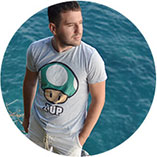Пройти курс на Coursera "How to learn"
Об этом курсе:Этот курс позволит Вам получить легкий доступ к бесценным техникам обучения, которыми пользуются эксперты искусства, музыки, литературы, математики,науки, спорта, и других дисциплин. Мы узнаем о том, как мозг использует два совершенно разных способа изучения информации, а также о том, как он хранит информацию ("раскладывает по полочкам"). Также мы коснемся вопросов мнимого обучения, техник запоминания информации, изучим варианты противостояния прокрастинации, и рассмотрим лучшие способы обучения, которые согласно исследованиям, помогут наиболее эффективно овладеть сложными предметами.
Пользуясь этими методиками вы сможете поменять свои мыслительные процессы и свою жизнь, независимо от ваших знаний в области, которую вы хотите изучить. Если вы уже являетесь экспертом в определенной области, то этот обзор ментальных техник поможет вам зарядиться энергией для успешного обучения, а неожиданные советы по прохождению тестов и скрытые закономерности, о которых мы поговорим, помогут Вам наиболее рационально использовать свое время на решение поставленных задач и проблем. Если вы столкнулись со сложной задачей, вы найдете кладезь неоценимых материалов по практическим техникам решения ваших вопросов. Если хоть один раз у Вас возникало желание преуспеть в чем-либо, этот курс станет Вашим проводником!
Критерий завершения
4 недели курса пройдены!
Личные ресурсы
Время, интернет, желание
Экологичность цели
Курс мне поможет обучаться продуктивнее
-
Week 1
What is Learning?
Although living brains are very complex, this module uses metaphor and analogy to help simplify matters. You will discover several fundamentally different modes of thinking, and how you can use these modes to improve your learning. You will also be introduced to a tool for tackling procrastination, be given some practical information about memory, and discover surprisingly useful insights about learning and sleep.
-
Лекция: Introduction to the Focused and Diffuse Modes
-
Лекция: Terrence Sejnowski and Barbara Oakley--Introduction to the Course Structure
-
Материал для самостоятельного изучения: Welcome and Course Information
-
Лекция: Using the Focused and Diffuse Modes--Or, a Little Dali will do You
-
Лекция: What is Learning?
-
Тест на оценку: Introductory Quiz (Lots of fun and useful info!)
-
Материал для самостоятельного изучения: Get to Know Your Classmates
-
Лекция: A Procrastination Preview
-
Лекция: Practice Makes Permanent
-
Лекция: Introduction to Memory
-
Лекция: The Importance of Sleep in Learning
-
Лекция: Interview with Dr. Terrence Sejnowski
-
Лекция: Summary video for Module 1
-
Лекция: Excitement About What's Next! MaryAnne Nestor Gives Special Hints
-
Тест на оценку: What is Learning?
-
Материал для самостоятельного изучения: Reading: Focused versus Diffuse Thinking
-
Материал для самостоятельного изучения: A Posting about Anxiety, Depression and PTSD from a learner in Learning How to learn
-
Лекция: Optional Interview with Dr. Robert Bilder on Creativity and Problem Solving
-
Лекция: Optional Interview with Writing Coach Daphne Gray-Grant
-
Лекция: Optional Interview with "Benny the Irish Polyglot" about Learning Languages
-
Взаимная оценка: Reflective Essay about a Learning Challenge
-
-
Week 2
Chunking
In this module, we’re going to be talking about chunks. Chunks are compact packages of information that your mind can easily access. We’ll talk about how you can form chunks, how you can use them to improve your understanding and creativity with the material, and how chunks can help you to do better on tests. We’ll also explore illusions of competence in learning, the challenges of overlearning, and the advantages of interleaving.
-
Лекция: Introduction to Chunking
-
Лекция: What is a Chunk?
-
Лекция: How to Form a Chunk - Part 1
-
Лекция: How to Form a Chunk - Part 2
-
Лекция: Illusions of Competence
-
Тренировочный тест: Retrieval Practice
-
Лекция: What Motivates You?
-
Лекция: The Value of a Library of Chunks
-
Лекция: Overlearning, Choking, Einstellung, and Interleaving
-
Лекция: Summary
-
Тренировочный тест: Retrieval Practice
-
Тест на оценку: Chunking
-
Материал для самостоятельного изучения: Reading: Chunking
-
Лекция: Optional Interview with Dr. Norman Fortenberry - Learning at MIT
-
Лекция: Optional Interview with Scott Young, a "Marco Polo" of Learning
-
Лекция: Optional Interview with Author Amy Alkon
-
-
Week 3
Procrastination and Memory
In this module, we talk about two intimately connected ideas—procrastination and memory. Building solid chunks in long term memory--chunks that are easily accessible by your short term memory—takes time. This is why learning to handle procrastination is so important. Finally, we talk about some of the best ways to access your brain’s most powerful long term memory systems.
-
Лекция: Introduction to Procrastination and Memory
-
Лекция: Tackling Procrastination - It's Easier, and More Valuable, Than You Think
-
Лекция: Zombies Everywhere
-
Лекция: Surf's Up: Process Versus Product
-
Лекция: Harnessing Your Zombies to Help You
-
Лекция: Juggling Life and Learning
-
Лекция: Summing Up Procrastination
-
Тренировочный тест: Retrieval Practice
-
Лекция: Diving Deeper into Memory
-
Лекция: What is Long Term Memory?
-
Лекция: Creating Meaningful Groups and the Memory Palace Technique
-
Лекция: Summing Up Memory
-
Тренировочный тест: Retrieval Practice
-
Тест на оценку: Procrastination and Memory
-
Материал для самостоятельного изучения: Reading: Procrastination and Memory
-
Лекция: Optional: Caroline on Learning Something Difficult that Others Think isn't "You"
-
Лекция: Optional Interview with 4 Time US Memory Champion Nelson Dellis
-
Лекция: Optional Interview with Dr. Robert Gamache, an Award-winning Bilingual Scientist
-
Лекция: Optional Interview with Stanford's Keith Devlin, the NPR "Math Guy"
-
Взаимная оценка: Final Project: Learn by teaching others how to learn
-
-
Week 4
Renaissance Learning and Unlocking Your Potential
In this module we’re going to talk more about important ideas and techniques that will enhance your ability to learn. You’ll also discover how to more profitably interact with fellow learners, how to recognize your own strengths, and how to avoid the “imposter syndrome.” Fighter pilots and surgeons use checklists to help them with their critical duties—you can use a similar checklist to help you prepare for tests. Ultimately, you will learn more about the joys of living a life filled with learning!
-
Лекция: How to Become a Better Learner
-
Лекция: Introduction to Renaissance Learning and Unlocking Your Potential
-
Лекция: Create a Lively Visual Metaphor or Analogy
-
Лекция: No Need for Genius Envy
-
Лекция: Change Your Thoughts, Change Your Life
-
Тренировочный тест: Retrieval Practice
-
Лекция: The Value of Teamwork
-
Лекция: A Test Checklist
-
Лекция: Hard Start - Jump to Easy
-
Лекция: Final Helpful Hints for Tests
-
Лекция: Summary
-
Лекция: Wrapup to the Course by Terrence Sejnowski and Barbara Oakley
-
Тренировочный тест: Retrieval Practice
-
Тест на оценку: Final
-
Материал для самостоятельного изучения: Reading: Renaissance Learning and Unlocking Your Potential
-
Лекция: Optional: Part 1: How NOT to Take a Test, Interview with Dr. Richard Felder and Dr. Rebecca Brent
-
Лекция: Optional: Part 2: Learning Something New, Interview with Dr. Richard Felder and Dr. Rebecca Brent
-
Лекция: Optional: Part 3: The Imposter Syndrome and Dealing with Procrastination, Interview with Dr. Richard Felder and Dr. Rebecca Brent
-
Лекция: Optional: Writer John Maguire (readablewriting.com) on the Importance of Putting Objects in Your Writing
-
Лекция: Optional Interview with William Craig Rice on learning in the humanities
-
Материал для самостоятельного изучения: Farewell and Hello!
-
- 2862
- 07 августа 2016, 13:56
Не пропустите новые записи!
Подпишитесь на цель и следите за ее достижением



